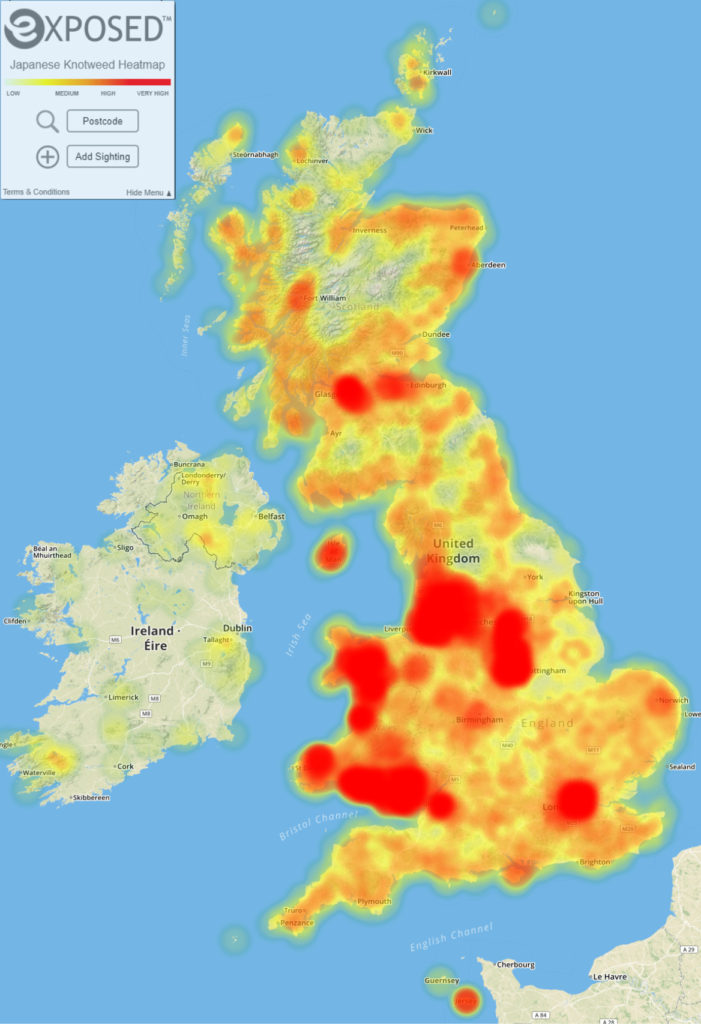A third of Brits would buy a property with Japanese knotweed, but at a reduced price

Japanese knotweed is no longer the deal-breaker it once was, with almost a third (32%) of British adults who are aware of Japanese knotweed prepared to go ahead and purchase an affected property, but at a reduced price, according to new YouGov research commissioned by Environet UK.
Exposed: The Japanese Knotweed Heatmap, an online tracking tool that launched earlier this year, identifies 24 infestations of the UK’s most invasive plant within 4km of Southend on Sea town centre and 13 infestations within 4km of Brentwood, suggesting Essex homeowners should be vigilant, particularly when buying or selling a property.
As awareness grows of the UK’s most invasive plant (78% of British adults are now aware of Japanese knotweed compared to 76% in 2018 and 75% in 2017) and the treatments and guarantees available to deal with it, homebuyers have greater peace of mind that it’s a problem that can be solved. As long as there is a professional treatment plan in place with an insurance-backed guarantee, they may not need to walk away from their dream home.
While half (50%) of those who are aware of the plant would walk away from a property which had Japanese knotweed, this is significantly less than the 78% who stated they would not buy an affected property two years ago, suggesting people are becoming increasingly pragmatic in their approach to the UK’s most invasive plant.
Of those who said they would proceed with the purchase at a reduced price, the majority (26%) would expect a discount of between 6 – 10%, while 15% would expect to knock off between just 1 – 5%. A further 15% would seek to reduce the price by more than a quarter. In Environet’s experience, a 10% reduction in the purchase price is typical in cases where property has been affected by Japanese knotweed, dropping to around 2-5% if it has been professionally treated.
Japanese knotweed can now be completely removed within a matter of days, at any time of the year, using a digging out method that sifts the earth to remove all viable rhizome roots from the infected soil. Once the problem has been tackled in this way or using a longer-term herbicide treatment and an insurance backed guarantee has been secured, almost all mortgage lenders will lend against the property and sales can proceed unhindered.
Nic Seal, Founder and MD of Environet said: “With an estimated 5% of all UK properties now affected by Japanese knotweed, either directly or indirectly, it’s encouraging to see homebuyers becoming increasingly rational in their approach. If left untreated, Japanese knotweed can cause considerable damage to a property which is why buyers and lenders are right to insist that there is a professional treatment plan in place before they agree to proceed.
“Due to the stigma around Japanese knotweed the property value will almost certainly be impacted, but all that’s required is a sensible renegotiation of the price. People are realising it doesn’t have to be a deal breaker.”
Chartered Surveyor Paul Raine, Director of Expert Surveyors Ltd, added: “The key to selling a property affected by knotweed is a Japanese Knotweed Management Plan from a reputable specialist. Always be honest if the property you’re selling is or has been affected, or it could come back to bite you in the form of litigation from your buyer further down the line.”
Due to the spread of Japanese knotweed, neighbourly disputes are on the rise and the vast majority of homeowners see their local council as being the first port of call in a row over Japanese knotweed encroachment, which occurs when the plant has been left untreated and allowed to spread onto an adjacent property. If the neighbour whose land was the source of the encroachment failed to act, 42% of homeowners would contact their local council in the first instance, while 16% would contact their building insurer and 13% would take immediate legal action through court proceedings.
This faith in the ability of local councils to help deal with the problem could be a result of a Bristol City Council’s successful use of ASBO legislation in December 2018 to prosecute a landowner who allowed Japanese knotweed to encroach into the gardens of seven neighbouring homes.
Japanese knotweed was first introduced into the UK from Japan in the 1850s as an ornamental plant, but it is now number one on the Environment Agency’s list of the UK’s most invasive plant species, described as “indisputably the UK’s most aggressive, destructive and invasive plant”. Growing up to 3 metres in height, it spreads rapidly between May and September and can push up through asphalt, cracks in concrete, driveways, cavity walls and drains.
Environet estimates that approximately 850,000 to 900,000 UK households are affected and suffering an average reduction in value of around 10%, knocking almost £20 billion (£19.8 billion) off property values.




